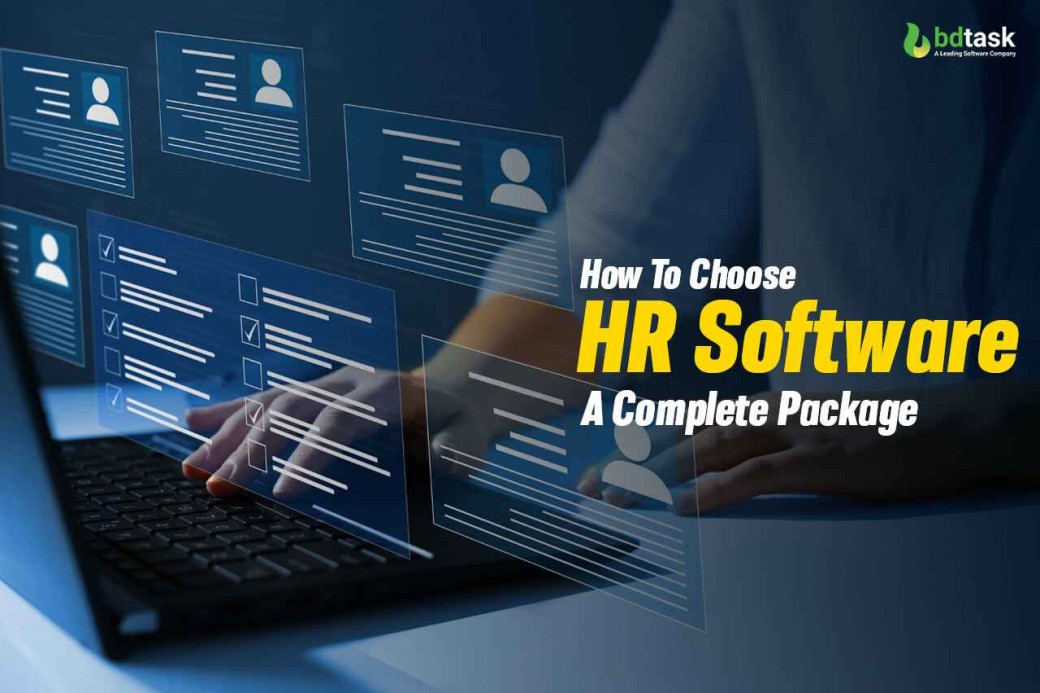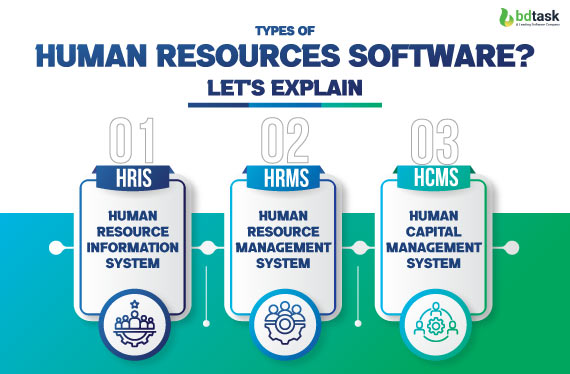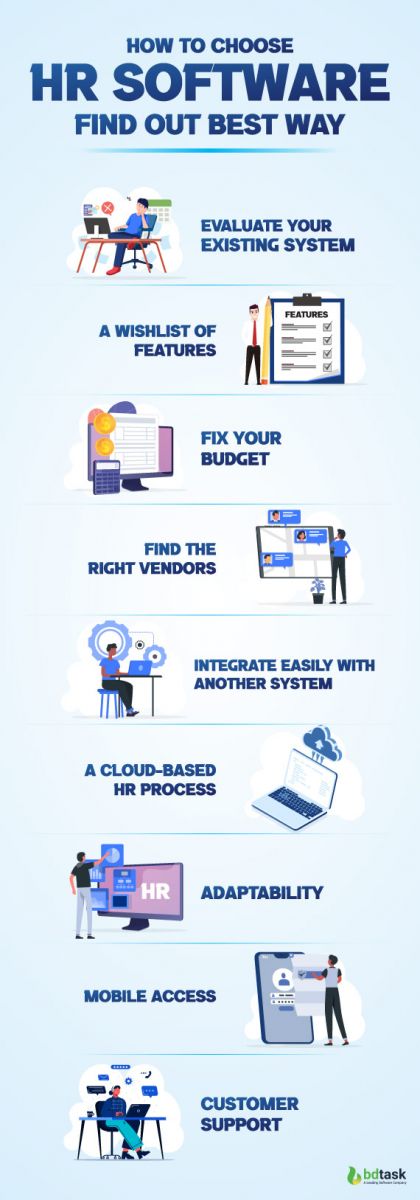How To Choose HR Software-A Complete Package

The company's ultimate success depends on how well its employees are managed and treated. This is where HR software is truly needed. But you need to learn how to choose HR software. The wrong HR system could mislead your company's needs and be a waste of money and time.
The right HR software can greatly affect an organization's efficiency and ensure maximum ROI. It saves the company time, money and a ton of paperwork.HR management is rapidly changing the field, and it's ultimately the key to success.
But with so many options out there, how do you decide which HR software is usable for you?
No worries, and keep calm. We will break down how to choose HR software, a complete guideline for tons of questions.
Let's check this blog and find out the best one for your company.
What is HR Software?
HR software is a digital solution that helps to process all HR-related work such as employee information management and document routing. It also helps the HR team to increase the efficiency of the daily work.
HR software saves huge labourers time because all HR work is done through automation.
This software helps all the HR processes to perform better. In short, it is a better planning, budget management, and decision-making tool for HR.
It's not only a tool for HR but also for employees and management. It helps to optimise their daily tasks so that they can perform at their fullest potential. As a result, it boosts maximum productivity while ensuring overall satisfaction.
Types of Human Resources Software?-let's Explain
There are various types of human resource software available in the market. Their features and functionality are different as well. So you have to pick the right one according to your requirements. Because A wrong selection can affect our company's money, time, and productivity. Let's explain the different types of HR software. It will help us understand the basics of human resource software.

The three main types of HR database are
- Human Resource Information System (HRIS)
- Human Resource Management System (HRMS)
- Human Capital Management System (HCMS )
All those HR Systems support the same core function, which includes
- Employee data
- Payroll system
- Employee training record
- Track down performance report
- Employee self-service option
But still, there are some differences among them. That is the depth and breadth of their HR coverage.
Human Resource Information System (HRIS)
This HRIS system covers all the basic functions from Data management to data capture perspective. It is the most popular HR software for basic users.
It includes
- Employee data management
- Payroll and compensation management
- Time and attending tracking
- Benefits administration
- Reporting and self-service
User: selecting an HRIS system is a good choice for Small to medium businesses.
Price -lower than other types of systems because of limited functionalities.
Human Resource Management System (HRMS)
This HRMS system has more features and functionalities than the HRIS system. These include
- Recruitment
- Onboarding
- Performance management
- Advanced reporting and analytics
- Offboarding
- Performance management
- Resource management
User: Medium to large-sized companies seeking or using this HRMS software solution.
Price: The difference between HRM to HRMS is its Moderate price but broader features.
Human Capital Management System (HCMS)
HCMS give you full access to your software. You can track down every little bit of detail on your employee's overall activity. A strategic approach to managing your office's human capital. Its market size also growing.
It's not only all the features of HRMS and HRIS hold but also some other additional features as well. It includes
- Recruitment strategy
- Performance management
- Learning and development
- Talent reviews and succession planning
- Total compensation management
- Workforce analytics and insights
- Employee engagement and Well-being
- Proactive risk management
User: Best for large organizations and large companies.
Price: Higher price due to its strategic focus and comprehensive features.
You have a question for us which one is the best HR management software?
The answer is It depends on your requirements and also other things. After getting information from different types of hr software it's time to learn how to choose the hr software in detail.
How To Choose HR Software - Find Out Best Way

Choosing the best HR software for your organisation should not be tough if you know the proper way. For that, you have to follow a few criteria. Follow this step to select the right software for your team.Also let's learn What to consider when choosing HR software
1. Evaluate Your Existing System
If you have an HR system in your organization but you are not satisfied with the present one. Then please evaluate your system first. It is important to clarify what is lacking in the system. A proper system can boost your work on the other hand an unfit system can ruin time and productivity. When evaluating your existing HR system, consider whether it includes tools for document management, such as a pdf to ms word converter, to streamline administrative tasks.
It would be best if you painted a clear picture for next year.
So check every detail of your HR system, and then if it is really old, then make an upgrade.
Top considerations may include things
- Information siloes
- Repetitive manual tasks
- Ineffective customer support
To get a clear picture, here are some questions you can ask yourself
- Using another HR system, but it's not good
- HR department’s most common challenges?
- Are there any time-consuming HR processes?
- Are your employees satisfied with the current system?
- What is your budget?
- what is the return on investment (ROI)?
- What are your organization’s policies regarding data security?
A clear thought about your needs upfront will increase the chances that your new software will accomplish your goals.
2. A Wishlist Of Features
Define the specific feature you need
A proper wishlist that has all the features that you need for your organization. Note down all the features you need for your company. List some of the HR systems after noting down all your requirement features. Hold on !!!
For example
For example
- You may need software that covers double HR domains like payroll, benefits and performance.
- You may need an HR software that unlocks all the functions and includes complex calculations, workflows and reports.
- You may need software that easily integrates your existing software, such as accounting, CRM, or ERP.
- You may need a simple, user-friendly dashboard that easily handles software.
- By listing your requirements, you can properly filter out which one is in and which is out.
We gathered a list of features that cover all the basic HR software. A few of the key features include
- Employee database
- Absence and leave management
- Hiring process automation
- Training management
- Employee scheduling software
- Integrations with other HR software
- Reporting & analytics
- Employee self-service portal
- Manager self-service portal
- Employee development
- Benefits administration
- Performance management tools
- Recruiting and applicant tracking
- Document management and storage
- Talent pool searchability
- Employee onboarding & offboarding
If you need more than that we also have a list also . All those features you can get from HRMS and HCM.
- Employee management platform
- Custom workflow team
- Employee satisfaction survey
- Built-in training tools
3. Fix Your budget
Budgeting is the biggest and most concerning issue nowadays. It is best to be clear about the size of your budget and stick to it. If you are growing your business, consider HR software that provides full flexibility. In these cases, the price of a package is likely to increase when the number of employees rises.
Several factors depend on making a perfect budget for your hr software.
- Type of HR software
- Number and types of users
- Customization and features
- Implementation
- Hardware and maintenance
- Training and support
So, Set a realistic budget based on your company’s financial health. Account for initial costs and recurring expenses. Ensure flexibility to accommodate unexpected expenses or necessary upgrades.
4. Find The Right Vendors
Once you’ve identified your needs and key features, it’s time to evaluate the vendors. Here’s a step-by-step process to help you make an informed decision
Step 1
Let's Start by researching HR software vendors and creating a shortlist of those that meet your criteria. Consider reading reviews on sites like G2, Capterra, and Trustpilot to get a sense of user satisfaction.
Step 2
Reach out to the shortlisted vendors and request demos of their software. This will give you a hands-on look at the interface and features.
Step 3
Ask vendors for references from other customers in your industry. Contact these references to learn about their experiences with the software and vendor support.
Step 4
Compare pricing models among vendors. Some may offer subscription-based pricing, while others may charge per user or feature. Make sure you understand the overall cost of the ownership and also the hidden fee.
Step 5
Please make sure that the software is integrated with your existing systems and infrastructure.
Discuss integration capabilities with the vendor. Evaluate the vendor’s customer support options. Consider the availability of support (e.g., 24/7, business hours), support channels (e.g., phone, email, chat), and the quality of their knowledge base and training materials.
Carefully review the vendor’s terms and conditions, including service level agreements (SLAs), data privacy policies, and contract terms.
5. Integrate Easily With Another System
It only makes sense to use two disparate systems when you have an HR system that has the power to integrate easily with another system.
Suppose payroll data is a complex function. If you have HR software that integrates with the HR system, it's easy for HR and the company as well.
Modern HR solution integrates with other business areas to help ease your administration workload. As a result, it will reduce the risk of human error and improve efficiency.
6. A cloud-based HR process
Data security is extremely important for any HR process also for any organisation. As you know, HR and payroll contain highly sensitive employee information.
It includes information like
- Home address
- Bank account number
- Tax documents
- Employee history
- Medical records.
So sudden access to this sensitive data is a big area of concern for an HR manager.
So what is the solution to it?
A cloud-based HR software vendor is the solution for that. Look for features like data encryption, role-based access controls, and compliance with data protection regulations.
Also, don't forget about regular audits and monitoring. These help find many issues, including security and other major problems.Data security is extremely important for any HR process also for any organisation. As you know, HR and payroll contain highly sensitive employee information.
It includes information like
- Home address
- Bank account number
- Tax documents
- Employee history
- Medical records.
So sudden access to this sensitive data is a big area of concern for an HR manager.
So what is the solution to it?
A cloud-based HR software vendor is the solution for that. Look for features like data encryption, role-based access controls, and compliance with data protection regulations.
Also, don't forget about regular audits and monitoring. These help find many issues, including security and other major problems.
7. Adaptability
Business motives change, grow, and develop. So adaptability is also important before picking up any HR software. The world is changing, as are business motives.
HR scalability allows your human resource model to change as your business evolves. It's now a common practice over the years, especially with the growing popularity of the business process.
So, pick the easily adaptable HR software. Cloud-based HR software is the perfect choice for you in that case. Because it's subscription-based, and you pay for what you use.
8. Mobile Access
Work can happen anytime and anywhere. With remote work on the rise, mobile access is increasingly important.
A mobile app allows an HR manager to easily access any file and edit it without hassle. Ensure the software has a mobile app or a responsive design that allows access from any device.
Here are the five ways that HR mobile benefits the company
- Mobile apps give employees real-time access to pay statements and schedules.
- Easily access from remote places.
- Mobile apps help employees to complete tasks more easily than before.
The last mobile HR apps typically came with advanced security features.
such as
- Multi-factor authentication
- Data encryption
It ensures that employee data is protected from unauthorised access or theft.
9. Customer Support
Less customer support leads to frustrations among employees and decreased productivity, which negatively impacts the organization's overall performance.
Customer support plays an important part in how to choose HR software sections.
Reliable customer support through a chatbot is important for resolving issues quickly and ensuring smooth operation. Look for vendors that offer 24/7 support, multiple contact options and secure service.
Before you make a decision, make sure you read and practically go through the process explained in this guide. After all that find out what type of HR software fits your needs and which one suits for company.
Core Benefits of Using HR Software
Alongside the basic functionalities of employment data keeping, HR software can do many more things. We gather some of the best benefits you can get using HR Software.
Simplify the working process
HR software can automate and simplify a lot of HR team tasks. Suppose your hr team manually processes some of the file reviews. It can take much time and effort to track down the right people and get their feedback. But if you have the right HR solution, then it will be done within some time and faster than the total process.
Help To Make Informed, Faster Decisions
If you want to grow your organisation faster, HR software might be your solution. Sometimes, important documents and data need to be found quickly. Hr software helps collect crucial documentation in one place. As a result, teams can retrieve files instantly and make more informed, faster decisions.
Manage Your Employee Better
HR software improves employee management more smoothly and also reduces the retention rate. It will help you to identify by analysing performance management data. Moreover allows you to organise more meaningful learning courses for your employees. Not only does this improve your organisation's productivity, but you'll also be able to retain employees more easily when they see that you are taking their needs into account.
Seamless Communication
Communication is the key to any company or organization achieving their desired goal. Without proper communication, it will be tough for any company to get potential output. A human resource system helps to maintain unbreakable communication among all your employees. It has an internal chat system to facilitate seamless communication among your employees.
Block Possible Cyberattacks
It's really important to protect all the employees' sensitive data. HR team needs to maintain all the employees' confidential data. Still, many well-known companies store their employees' data in physical files, which now violates security regulations.
Deploying a secure human resources management system helps to protect it from the latest security threats and data vulnerabilities. Built-in security features can include:
- Permission controls that regulate and restrict user access
- Strong password policies
- Digital signatures to notify teams of unauthorized document
Which is the Best HR Software?
With the right technology in hand, it is a hassle for a company or organization. Above the method, you get a better view of choose the right HR software. Among multiple human resources available in the software market, here is our choice to suggest you
Why did you choose a human resource management system as your software?
- Easily Integrate with Human Resource Management App
- User-friendly dashboard system
- Error-free asset allocation
- Automated attendance facility
- Employee management facility program
- progressive report
- Secure and cloud-based
- Recruitment & Training Management
Feature to check them out
- Employee information management system
- Attendance management system
- Asset & equipment management
- Bank & loan management system
- Leave tracking system
- Dynamic report system
- Employee recruitment system
- Notification system
- Communication system
- Account management system
- Payroll management system
- Expense & income reports
- Department management system
- Employee Leave Management System
Endnote
If you are serious about how to choose HR software then the above guideline is for you. The HR system is the system that controls and removes all the chaos in the organization. It not only reduces the chaos of the organization but also reduces the burden of manual work on your HR department. Select the right HR software and score a home run for your business goal.











